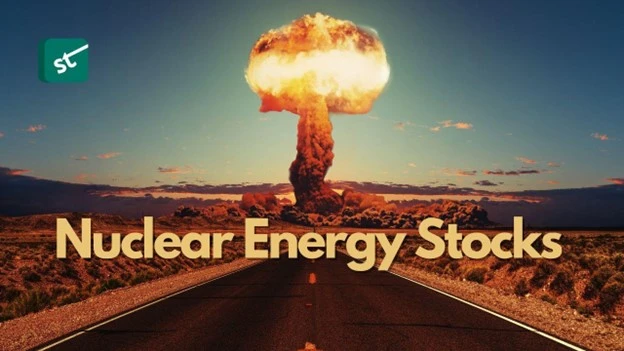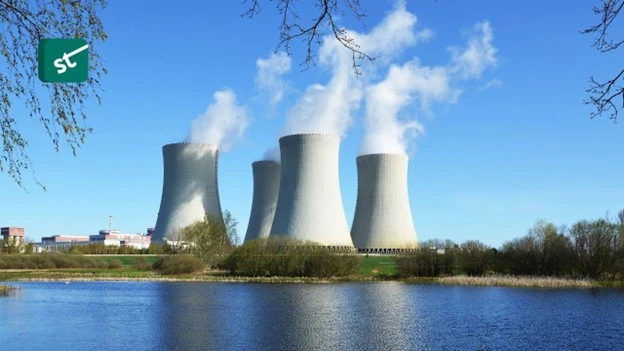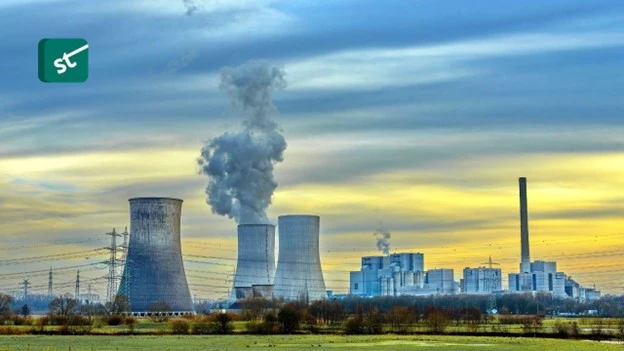As the world grapples with the urgent need to transition to clean and sustainable sources of energy, the role of nuclear power has come under renewed scrutiny.
With concerns about climate change, pollution, and resource depletion on the rise, many investors are seeking opportunities that align with their values and offer long-term growth potential. In this article, we argue that now is the time to consider investing in nuclear energy stocks.
With advancements in technology, safety measures, and supportive government policies, nuclear power is gaining renewed attention as a reliable and low-carbon energy source.
We aim to provide concise and insightful guidance for investors seeking to align their portfolios with clean energy and sustainability goals.
Don’t miss out on the opportunities that nuclear energy stocks can offer. Join us as we explore the potential of this dynamic sector and unlock the investment potential of nuclear power to take your portfolio to lofty new heights.
The Benefits of Investing in Nuclear Energy Stocks
Investing in best nuclear energy stocks can offer several potential benefits. Here are some key advantages associated with investing in nuclear stocks:
-
Long-Term Growth Potential
Nuclear energy is considered a clean and reliable source of power generation, and its demand is expected to increase in the coming years.
As countries around the world aim to reduce carbon emissions and transition to cleaner energy sources, nuclear power is often included in their energy mix.
Investing in nuclear energy stocks can provide exposure to a sector with long-term growth potential as nuclear power expands globally.
-
Diversification
These stocks can provide diversification to an investment portfolio. By including stocks from different sectors and industries, investors can potentially reduce risk by spreading their investments across various assets.
Adding best nuclear energy stocks to a portfolio can help diversify exposure beyond traditional energy sectors like oil and gas.
-
Stable And Predictable Cash Flows
Nuclear power plants generally have long operational lives and provide stable and predictable cash flows.
Once a plant is operational, it can generate electricity consistently, making the revenue streams of nuclear energy companies more reliable compared to some other sectors. This stability can be attractive to income-seeking investors who value consistent dividend payouts.
-
Energy Security
Nuclear power offers a reliable and domestic energy source. Investing in the nuclear energy sector can contribute to energy security, as nuclear power reduces dependence on imported fossil fuels and helps diversify a country’s energy supply.
-
Technological Advancements
The nuclear energy sector continues to evolve with advancements in technology. Innovative solutions, such as small modular reactors (SMRs) and advanced reactor designs, are being developed, offering potential investment opportunities.
These advancements aim to improve safety, efficiency, and cost-effectiveness in nuclear power generation.
Factors Affecting Nuclear Energy Stocks in 2023
Several factors can influence nuclear stocks in 2023. While it’s important to note that the following factors are subject to change and uncertainty, here are some key aspects to consider:
-
Government Policies and Regulations
Government policies and regulations play a significant role in the nuclear energy sector. Changes in regulations related to safety standards, licensing, subsidies, and incentives can impact the profitability and growth prospects of nuclear energy companies.
Investors should monitor government policies and regulations related to nuclear energy, both at the national and international levels.
-
Energy Transition and Climate Change Goals
The global focus on reducing greenhouse gas emissions and mitigating climate change is driving the adoption of cleaner energy sources. Nuclear power is considered a low-carbon energy option, and its role in achieving climate goals can influence nuclear power companies stocks.
Policies and commitments related to carbon pricing, renewable energy targets, and clean energy investments can shape the demand for nuclear power and impact the performance of nuclear energy companies.
-
Public Perception and Social Acceptance
Public perception of nuclear energy can impact the industry. Concerns related to safety, waste management, and the potential for accidents can shape public opinion and influence decision-making by governments and regulators.
Any significant incidents or public debates regarding nuclear energy can affect the sentiment and performance of stocks of nuclear energy sector.
-
Technological Advancements
Technological advancements in the nuclear energy sector, such as small modular reactors (SMRs), advanced reactor designs, and improved safety features, can impact the industry’s growth prospects.
Investors should stay informed about the progress of new technologies and their potential commercialization, as successful advancements can drive investor confidence and interest in stocks of nuclear energy sector.
-
Global Energy Demand and Electricity Markets
The overall demand for electricity and the dynamics of the electricity markets can influence the profitability of nuclear energy companies.
Factors such as economic growth, industrial activity, population growth, and energy policies of various countries can impact electricity demand and pricing.
Investors should consider the energy market conditions and the competitive landscape when assessing the performance of nuclear energy stocks.
-
Nuclear Waste Management and Decommissioning
The safe management of nuclear waste and the decommissioning of aging nuclear power plants are significant challenges for the industry.
Changes in regulations, costs associated with waste disposal and decommissioning, and the development of innovative solutions can impact the financial outlook of nuclear energy companies.
Key Metrics for Evaluating Nuclear Energy Stocks
When evaluating stocks from nuclear energy sector, there are several key metrics and factors to consider. These metrics can help you assess the financial health, profitability, and growth potential of nuclear energy companies. Here are some important metrics to consider:

-
Revenue and Earnings
Analyze the company’s revenue growth and profitability over time. Look for consistent or improving revenue trends and positive earnings. Evaluate the company’s ability to generate stable and increasing cash flows.
-
Capacity and Utilization Rates
Examine the capacity and utilization rates of the company’s nuclear power plants. Higher capacity utilization indicates efficient operations and the potential for increased revenue generation.
-
Nuclear Fleet and Pipeline
Consider the size and composition of the company’s nuclear fleet. Look for a diversified portfolio of operating nuclear plants, as well as a pipeline of planned or under-construction plants. A robust pipeline suggests future growth opportunities.
-
Safety and Regulatory Compliance
Evaluate the company’s safety record and regulatory compliance. Look for strong safety culture, adherence to regulatory standards, and proactive measures to mitigate risks associated with nuclear operations.
-
Cost Efficiency and Margins
Assess the company’s cost structure, operating margins, and ability to control costs. Look for companies with efficient operations and improving margins over time.
-
Debt Levels and Financial Stability
Examine the company’s debt levels and financial stability. Evaluate the debt-to-equity ratio, interest coverage ratio, and cash flow adequacy to service debt. A company with a manageable debt burden and strong financial position is better positioned to navigate challenges.
-
Dividend Yield and Payout Ratio
Consider the company’s dividend yield and payout ratio. A stable or increasing dividend, supported by consistent earnings and cash flows, can be attractive for income-seeking investors.
-
Research and Development (R&D) Efforts
Assess the company’s investment in R&D for technological advancements, safety enhancements, and operational efficiency. Companies with a focus on innovation and continuous improvement may be better positioned for long-term growth.
-
Political and Regulatory Environment
Monitor the political and regulatory environment for nuclear energy. Changes in government policies, regulations, and support for nuclear power can impact the industry’s outlook and the performance of stocks of nuclear energy sector.
-
Market Position and Competitive Advantage
Evaluate the company’s market position, competitive advantage, and differentiation. Consider factors such as long-term contracts, customer relationships, and strategic partnerships that provide a competitive edge.
Best Energy Sector Stocks to Buy in 2023
Here is the list of best Energy Sector stocks to buy in 2023:
Brookfield Renewable
Brookfield Renewable Partners (NYSE: BEP) stands out as a compelling investment option for 2023, backed by a proven track record of successful investment management and value creation for shareholders.
With a robust Renewables division, the company has ambitious expansion plans that are expected to drive double-digit growth in funds from operations (FFO) and deliver impressive returns of 12-15% to shareholders over the next five years.
Recently, Brookfield entered into the nuclear space amid aggressive expansion through an $8 billion acquisition of Westinghouse with strategic partner Cameco. This positions it as a key player in the US nuclear power industry.
Brookfield Renewable is positioning itself at the forefront of a global nuclear energy revival.
It is doing so by taking the initiative in markets such as Poland, the United Kingdom, Asia, and the Middle East, where there is renewed interest in nuclear power after decades of stagnation following the Chornobyl disaster.
The company is actively pursuing opportunities to capitalize on the growing demand for nuclear power plants in these regions.
ConocoPhillips
ConocoPhillips (NYSE: COP) is an interesting name to spot on a list of renewable energy stocks. This is especially so because ConocoPhillips is a mainstream American oil and gas explorer.
Despite this, the company has been tapping into its profits from fossil fuels to leverage its nuclear exposure and scale up competitively.
ConocoPhillips’ investment in nuclear energy allows it to balance its traditional fossil fuel operations with renewable energy, demonstrating its commitment to environmental, social, and governance (ESG) principles.
The company’s disciplined business model, generating free cash flow, maintaining a strong balance sheet, and demonstrating ESG leadership, has helped it overcome crises and grow profitably.
Chevron
Chevron Corporation (NYSE: CVX) is an undisputed giant in the global energy landscape, with its annual revenues exceeding $240 billion, as of 2022.
Chevron has a strong track record of operational excellence and financial stability, which can provide a solid foundation for venturing into the nuclear energy sector.
Chevron’s investment in Zap Energy Inc., a nuclear fusion start-up, positions it at the forefront of advancing innovative and scalable nuclear energy solutions. This puts CVX precisely on the list of best nuclear energy stocks to choose from.
This strategic move by a titan the size of Chevron demonstrates its commitment to low-carbon energy and potential for growth in the emerging nuclear market, making it an attractive investment option.

NextEra Energy
NextEra Energy Inc. (NYSE: NEE) is America’s largest renewable company, serving at least 12 million Americans through its well-established and robust energy transmission network.
Unlike most players on this list, NextEra is so compelling as a nuclear energy stock because it already has an established and running nuclear program, which is not only providing clean energy to 4 million homes but also avoiding the emission of 24 million tons of carbon dioxide.
NEE belongs to the category of attractive nuclear power stocks and has a remarkable proof of concept at play. As nuclear energy gains more favor, the stock may see a sustained climb in the coming years.
TC Energy
The Canadian energy infrastructure company, TC Energy Corporation (NYSE: TRP) is another worthy contender among the best stock of nuclear energy sector to consider for 2023.
Although TC power generation divisions include natural gas assets, its nuclear power generation remains its core domain of expertise. TC’s Bruce Power is the largest nuclear facility in the world and has a total capacity of 6,400 MW.
TC Energy is phenomenally positioned to take off in the wake of the anticipated nuclear renaissance.
As far as stocks of nuclear energy sector go, not only does TC Energy hold unparalleled expertise in the nuclear realm, but its history of over 70 years proves that it has withstood the test of time.
Williams Cos. Inc. (WMB)
According to Sam Horn, a senior investment analyst with the Polaris Global Value Fund, the transition to renewable energy cannot happen overnight due to the insufficient storage capacity currently available.
This limitation is attributed to the expensive commodities involved in building storage, such as lithium and nickel, which drive up the costs of renewable energy infrastructure.
As a result, natural gas will continue to play a vital role as a transitional fuel. Within the United States, natural gas is primarily transported through pipelines, and Williams Cos. Inc. (WMB), operates one of the largest pipeline networks in the nation.
However, it’s not solely the demand for the company’s pipeline network that makes it an attractive investment opportunity. Williams’ commitment to achieving a significant 56% reduction in greenhouse gas emissions by 2030, further adds to its appeal.
NOV Inc. (NOV)
In the current era of increasing focus on environmental, social, and governance (ESG) factors in risk assessment, even hydrocarbon producers are taking steps to address emissions reduction.
NOV Inc. (NOV) supplies equipment and technology to the upstream oil and gas industry. Notably, the Company has a strong track record of recycling approximately 60% of its total waste generated.
Moreover, NOV has introduced products aimed at reducing the emissions associated with its customers’ oil and gas operations, demonstrating its commitment to sustainability. In addition to its involvement in the oil and gas industry, NOV is well-positioned to contribute to the renewable energy economy.
The company designs, builds, installs, and supports renewable energy equipment and technology, with a specific focus on wind and solar solutions. This indicates NOV’s readiness to serve the evolving demands of the renewable energy sector.
TotalEnergies SE (TTE)
With a market capitalization of $149 billion, TotalEnergies SE (TTE) holds a prominent position as the largest energy company in France.
Established in 1924 as an oil and gas company, TotalEnergies has built its core business around the exploration, drilling, and refining of oil and gas resources.
However, in a significant strategic move announced in 2021, the company expressed its intent to transition towards cleaner energy sources.
As part of this transformation, TotalEnergies plans to allocate half of its capital investment budget over the next four years to natural gas and renewable energy projects.
In line with its commitment to cleaner energy, TotalEnergies underwent a rebranding in May 2021, changing its name from Total to TotalEnergies.
This change reflects the company’s vision to diversify its energy portfolio and embrace a more sustainable future.
While maintaining its expertise in the oil and gas sector, TotalEnergies aims to proactively explore opportunities in natural gas and renewable energy as part of its long-term strategy.
BP PLC (BP)
With a market capitalization of $108 billion, BP PLC (BP) stands as a significant player in the energy sector.
Founded in 1909, the company’s journey began with the discovery of oil in Iran. Since then, it has evolved into a global enterprise with operations spanning almost every continent.
BP has established itself as one of the foremost producers of oil and gas worldwide.
While BP’s core business continues to revolve around hydrocarbons, which remain profitable amid the surge in energy prices, the company is actively undergoing a profound transformation toward renewable energy production.
It has set a clear objective to become a net-zero carbon producer by 2050, reflecting its commitment to mitigating climate change and reducing carbon emissions.
Recognizing the importance of transitioning to a more sustainable energy landscape, BP is actively working towards diversifying its energy portfolio and investing in renewable energy sources.
This strategic shift reflects its determination to contribute to a cleaner and greener future while maintaining its strength in the hydrocarbon sector.
Enbridge Inc. (ENB)
Enbridge Inc. (ENB), with a market capitalization of $78 billion, is a leading energy infrastructure company known for its remarkable diversification.
Headquartered in Calgary, Canada, Enbridge operates an extensive network of oil and gas pipelines that span across the United States and Canada.
The company generates a significant portion of its revenue from activities such as natural gas refining, transportation, and storage.
In addition to its presence in the traditional energy sector, Enbridge has expanded its operations to include renewable power generation.
The company has made notable investments in wind, solar, and geothermal generation assets, showcasing its commitment to the growing importance of sustainable energy sources.
By embracing renewable technologies, Enbridge is actively participating in the transition to a cleaner and greener energy future.
Enbridge’s track record reflects its strong performance as an investment. With a 5-year average annualized return of 11.4% and a 10-year average annualized return of 2.9%, the company has demonstrated its ability to deliver consistent returns to its shareholders.
This success can be attributed to Enbridge’s diverse portfolio and its strategic positioning within the energy infrastructure sector.
EOG Resources Inc. (EOG)
EOG Resources Inc. (EOG), boasting a market capitalization of $66 billion, is a prominent player in the oil and natural gas development and production industry.
Headquartered in Houston, Texas, EOG Resources has established a strong presence in the United States and operates extensively in various regions.
Additionally, the company has expanded its international footprint, with operations in Canada, Trinidad and Tobago, China, and Oman.
Formerly a significant operating unit of the now-defunct energy conglomerate Enron, EOG Resources successfully split off from its parent company in 1999.
Despite the challenges faced during the decline and fall of Enron, EOG Resources persevered and emerged as an independent and resilient entity.
With a focus on oil and natural gas, EOG Resources has diligently developed its expertise in exploration, production, and operations. This strategic emphasis has contributed to the company’s commendable performance over time.
EOG Resources has achieved a 5-year average annualized return of 3.1% and an impressive 10-year average annualized return of 9.1%, demonstrating its ability to deliver consistent value to its stakeholders.
How to Invest in the Energy Sector
Now that we have gone over some of the best energy sector stocks to invest in for 2023, and in particular the top nuclear power stocks, we now discuss how can one invest in the wider energy sector. Some of the approaches to take are stated below:

- Exchange-Traded Funds (ETFs): Invest in ETFs that focus on the energy sector, including those that include energy stocks, for diversification.
- Direct Stock Investment: Purchase individual stocks of companies involved in energy production, technology, or services through a brokerage account.
- Mutual Funds: Invest in managed mutual funds that have exposure to the energy sector, including nuclear energy stocks. An example is the Vanguard Energy Fund.
- Renewable Energy Funds: Consider investing in funds that specifically focus on energy sources, including nuclear energy, for targeted exposure.

Risk Factors and Considerations for Nuclear Energy Stock
The question of how to invest in nuclear energy stocks is very important since not only can these stocks offer potential growth and profitability, but you should also be aware of the risks and considerations associated with nuclear power companies stocks. Here are some key points to consider:
-
Regulatory and Political Environment
The nuclear energy industry is heavily regulated due to safety concerns and potential environmental impacts.
Changes in regulations or political dynamics can significantly impact the operations and profitability of nuclear energy companies. Government support and policies play a crucial role in the growth and development of the industry.
-
Safety and Public Perception
Nuclear accidents, such as the Chornobyl and Fukushima disasters, have had long-lasting effects on public perception and sentiment toward nuclear power.
Any safety incidents or concerns can lead to increased scrutiny, stricter regulations, and public opposition, which can affect the reputation and financial performance of nuclear energy companies.
-
Capital-Intensive and Long-Term Nature
Nuclear power plants require substantial upfront investment and have long construction and operational cycles.
The capital-intensive nature of the industry can lead to high debt levels and significant financial risks. Delays or cost overruns in construction projects can impact profitability and shareholder returns.
-
Market Price Volatility
The price of nuclear energy can be influenced by various factors, including the cost of uranium, fossil fuel prices, and renewable energy alternatives. Fluctuations in these market dynamics can impact the competitiveness and profitability of nuclear energy companies.
-
Waste Management and Decommissioning
Radioactive waste management and decommissioning of nuclear facilities are critical challenges for the industry.
The cost and responsibility associated with proper waste disposal and facility decommissioning can be substantial. Companies need to allocate sufficient funds and manage these processes effectively, which can impact their financial stability and performance.
-
Technological Advancements and Disruption
Technological advancements, such as the emergence of alternative energy sources and improvements in renewable energy technologies, could disrupt the traditional nuclear energy market.
Companies that fail to adapt to changing industry dynamics and embrace innovation may face challenges in maintaining their competitive edge.
Future Outlook for Nuclear Energy Stocks
The future outlook for nuclear energy stocks is influenced by several factors that shape the industry’s landscape. While there are both opportunities and challenges, here are some key considerations for the future:
-
Energy Transition and Climate Change
As the global focus on reducing greenhouse gas emissions intensifies, nuclear energy is being recognized for its potential to provide clean and low-carbon power. Governments and organizations worldwide are acknowledging the role of nuclear energy in the energy transition.
This positive sentiment can present opportunities for nuclear energy stocks, especially as countries set ambitious carbon reduction targets.
-
Nuclear Power Expansion
Several countries are planning to expand their nuclear power capacity or introduce nuclear energy as part of their energy mix.
This includes both established nuclear power nations and those considering nuclear power for the first time. The construction of new reactors and the refurbishment of existing ones can drive demand for nuclear power companies stocks in the long term.
-
Technological Advancements
Advancements in nuclear reactor technology, such as small modular reactors (SMRs) and advanced reactors, offer potential benefits in terms of safety, efficiency, and scalability.
These innovations can enhance the competitiveness and attractiveness of nuclear energy, leading to increased investment and market opportunities for companies involved in advanced nuclear technologies.
-
Public Perception and Acceptance
Public perception of nuclear energy plays a crucial role in its future. Efforts to address safety concerns, improve transparency, and communicate the benefits of nuclear power can positively influence public acceptance.
A shift in public opinion towards viewing nuclear energy as a viable and sustainable option can contribute to the growth of the industry and support its stocks.
-
Nuclear Waste Management and Decommissioning
The safe management of radioactive waste and the decommissioning of aging nuclear facilities remain important challenges. Companies that excel in waste management solutions and decommissioning expertise may find opportunities in providing services to the industry.
Effective management of these aspects can enhance the credibility and long-term sustainability of nuclear energy, benefiting associated stocks.
-
Competition from Renewable Energy
Nuclear energy faces competition from renewable energy sources such as wind and solar, which have seen significant technological advancements and cost reductions.
The increasing affordability and scalability of renewables could impact the growth and investment attractiveness of nuclear energy.
However, the complementary nature of nuclear and renewable energy can also create opportunities for hybrid energy systems and collaboration between the two sectors.
Nuclear Power Plants and their Role in the Energy Market
Nuclear power plants play a significant role in the energy market, providing a reliable and consistent source of electricity. Here are some key aspects highlighting their importance:
-
Baseload Power Generation
Nuclear power plants are known for their ability to generate baseload power, meaning they can operate continuously and produce a constant supply of electricity.
Unlike intermittent renewable energy sources like solar and wind, nuclear power plants can provide a stable and predictable energy output, making them essential for meeting the base level of electricity demand.
-
Low-Carbon Energy
Nuclear power is a low-carbon energy source as it does not emit greenhouse gases during electricity generation.
With growing concerns about climate change and the need to reduce carbon emissions, nuclear power plays a crucial role in providing clean energy and contributing to global efforts to mitigate climate change.
-
Energy Security and Independence
Nuclear power helps enhance energy security by reducing reliance on imported fossil fuels. Countries with nuclear power plants can diversify their energy sources and decrease vulnerability to geopolitical uncertainties or fluctuations associated with fossil fuel imports.
This independence can provide greater stability and control over the energy supply.
-
Large-Scale Power Generation
Nuclear power plants can generate a significant amount of electricity, often on a large scale. This makes them suitable for meeting the energy needs of densely populated areas, industrial centers, and regions with high electricity demand.
-
Long Operational Lifespan
Nuclear power plants have a long operational lifespan, typically ranging from 40 to 60 years. This longevity allows for long-term planning and investment in energy infrastructure.
With proper maintenance and adherence to safety protocols, nuclear power plants can provide reliable electricity for several decades.

-
Grid Stability and Resilience
Nuclear power plants contribute to the stability and resilience of the electricity grid. Their ability to provide continuous power helps balance the grid during peak demand periods and ensures grid reliability, minimizing the risk of blackouts or power shortages.
-
Research and Innovation
The nuclear energy sector drives research and innovation in reactor technology, fuel efficiency, waste management, and safety protocols. Ongoing advancements in nuclear technology aim to enhance safety, improve efficiency, and address concerns related to waste disposal.
Concluding Remarks
Renewable energy stocks present a compelling investment opportunity in the energy sector, especially in the wake of the global shifts underway.
As the world transitions towards more sustainable and clean energy sources, companies involved in renewable energy are poised for potential growth.
With increasing global awareness of climate change and the need for decarbonization, renewable energy stocks can benefit from favorable regulatory policies and growing demand for clean energy.
In particular, nuclear energy stocks offer the potential for clean, reliable, and scalable energy generation with technological advancements and safety measures. With shifting sentiments, many anticipate a nuclear renaissance to be imminent, in the present environment.
FAQs
Why Invest in Nuclear Energy?
Investing in nuclear energy can offer opportunities for long-term growth, diversification, and participation in the transition to a low-carbon energy future.
What Are the Possible Drawbacks?
- Safety and environmental concerns associated with nuclear accidents and waste disposal.
- Regulatory and political risks, such as changes in government policies or public sentiment can impact the industry.
- High upfront capital costs and long project timelines for building new nuclear power plants.
- Volatility in uranium prices, which can affect the profitability of uranium mining companies.
- Potential public opposition to nuclear energy leads to project delays or cancellations.
- Uncertainty around the future of nuclear energy as renewable energy sources gains prominence.
What Are the Options for Investing in Nuclear Energy?
The options for investing in nuclear energy include:
- Stocks of nuclear power plant operators and uranium mining companies.
- Nuclear energy-focused exchange-traded funds (ETFs).
- Mutual funds with exposure to the nuclear energy sector.
- Investing in companies involved in nuclear technology and equipment manufacturing.
How To Invest in Nuclear Energy Stocks?
To invest in nuclear energy stocks, follow these steps:
- Open a brokerage account with a reputable online broker.
- Conduct research to identify nuclear energy companies of interest.
- Analyze the financial health, growth prospects, and industry trends of the companies.
- Determine the appropriate investment amount and risk tolerance.
- Place buy orders for the selected nuclear energy stocks through your brokerage account.
- Monitor your investments regularly and stay updated on industry news and developments.
- Consider diversifying your portfolio by investing in a mix of nuclear energy stocks and other sectors.
- Review and adjust your investment strategy as needed based on market conditions and individual goals.








